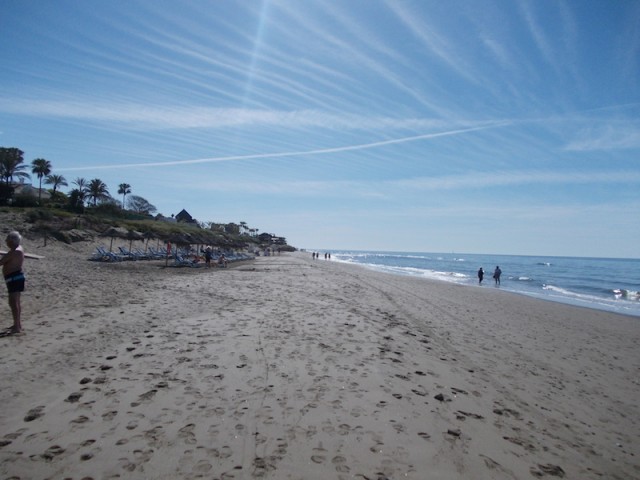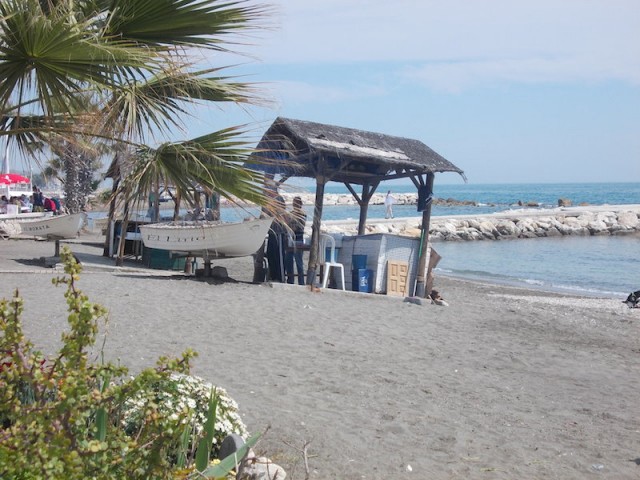Taking Advantage Of Friends In Faraway Places
by Emily Fowler

My little brother very kindly moved to the Spanish coast in February, giving me an extra option for where to go on vacation, or “holiday,” if you’re from the UK, as I am.
Before he moved, the boyfriend and I were planning when we could go over and see him, and a couple of months after he moved we made it over for a visit. Even though it was only a short break, being able to combine seeing my brother with getting some Spanish sunshine on our British skin was delightful. Even better, it was a real bargain, and here’s why.
Only paying for travel, not for accommodation
Two return flights came to less than £200, or around $310, and we could have got them even cheaper if we had visited during the week. Sadly, unlike me, the boyfriend has a set number of holiday days, so going Friday to Monday worked out better for him than the much cheaper Monday to Thursday.
A host who’s savvy about public transport
The boyfriend and I are generally good, and undeniably smug, about using public transport when we travel, whether it’s double decker trains in Italy or hair-raising bus rides in Goa, but there are still times when we end up getting a taxi. Sometimes it’s too late/too dark/too unknown, and an expensive taxi ride is the only option.
Staying with my brother meant we could travel to some amazing places for the handful of euros the buses and trains cost, and we didn’t have to hunt around for the right bus stop or the entrance to the train station.
Local knowledge of the best value places to visit
Staying with a local means you don’t end up in all the usual tourist (read: expensive) spots. Instead of sticking to the restaurants, attractions and trips advertised in every guide book about the area, you can enjoy this free gig at a local bar or that view of the mountains that’s too out of the way for most tourists to discover.
When you end up at a packed restaurant in an historic fishing quarter just outside a big city, where nobody else is speaking English and you’re served the freshest seafood straight from a barbeque on the beach, the journey there — two buses and a train — is suddenly worth it.

Not going out to eat every night
If I’m on holiday, I don’t want to cook. That means part of our holiday budget goes on food, and usually quite a large part of that: I spend months poring over TripAdvisor in the run up to a holiday to create a shortlist of restaurants to choose from once we’re there. When you’re staying with someone, you don’t tend to go out to eat so much, but more often than not you’re not the one slaving over a hot plancha. If and when you do take your turn — after all, there is the matter of the free accommodation you’re getting — it isn’t a chore.
It does of course help that my brother is a chef, so staying in and having him cook is almost like going out to a restaurant. When we did go out for drink at his place of work, his 50% staff discount helped nicely!

Let’s face it, wherever you go on holiday you’re going to spend a couple of days settling in, and staying with friends or family who live in an unfamiliar place lets you skip all that. I did wonder what my brother thinks about having people wanting to take advantage of his hospitality for a cheap holiday, but he seems fine with it.
“I’m very happy with friends and family coming to visit, and I told everyone before I left that they could come any time,” he said. “I noticed when you visited that playing tour guide made me look at everything with new eyes, making me appreciate everything more and giving me ideas of what to do next. It’s great to be able to share the good finds I’ve made with people who appreciate it.”
In fact, he even brought up something that I hadn’t thought about: where the money we spend at a destination goes, and who benefits from it.
“If you’re visiting a friend who lives in a tourist destination, you’ll spend less and you’ll probably spend it in a better way,” he explained. “Tourist money for a host country’s economy is often channelled through big corporations and hotels where the staff are low paid, so the main financial winners from a standard holiday are the big hotels, not the locals.”
See, staying with family doesn’t just save you money, it’s better for the local economy!
Overall, including flights, airport parking and spending money, a break for two came to less than £300, or around $470. Not only did we spend less money than we would usually do on a short break, but we got to spend quality time with my brother and go to some fabulous places that we probably wouldn’t have found on our own.
My suggestion would be to think about where in the world your friends and family are living, and find out whether you could take advantage of their hospitality to have a cheaper holiday/vacation. It doesn’t even have to be in another country. Maybe you live in a city and can stay with friends in the countryside, or if you live in a quiet spot in the country, a stay with family in a bustling metropolis you’ve never been to before might make for a fun trip.
Disclaimer: You actually have to like the friends or family members you’re visiting for this to work!
This story is part of our Travel Month series.
Emily Fowler is a UK-based freelance writer and crazy cat lady. When she’s not hopping on a plane to somewhere faraway, she writes about cats, finance and small business issues.
Support The Billfold
The Billfold continues to exist thanks to support from our readers. Help us continue to do our work by making a monthly pledge on Patreon or a one-time-only contribution through PayPal.
Comments